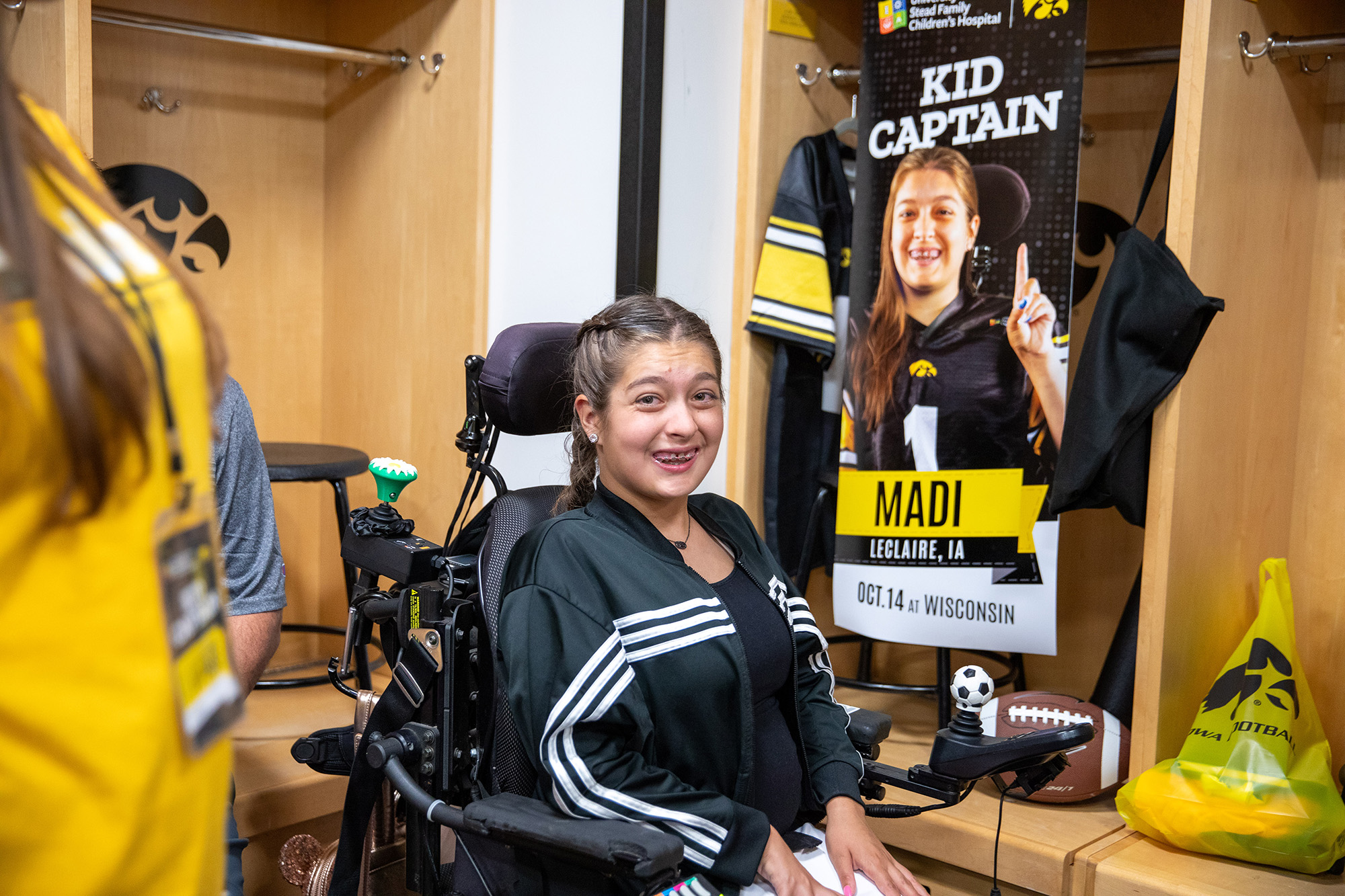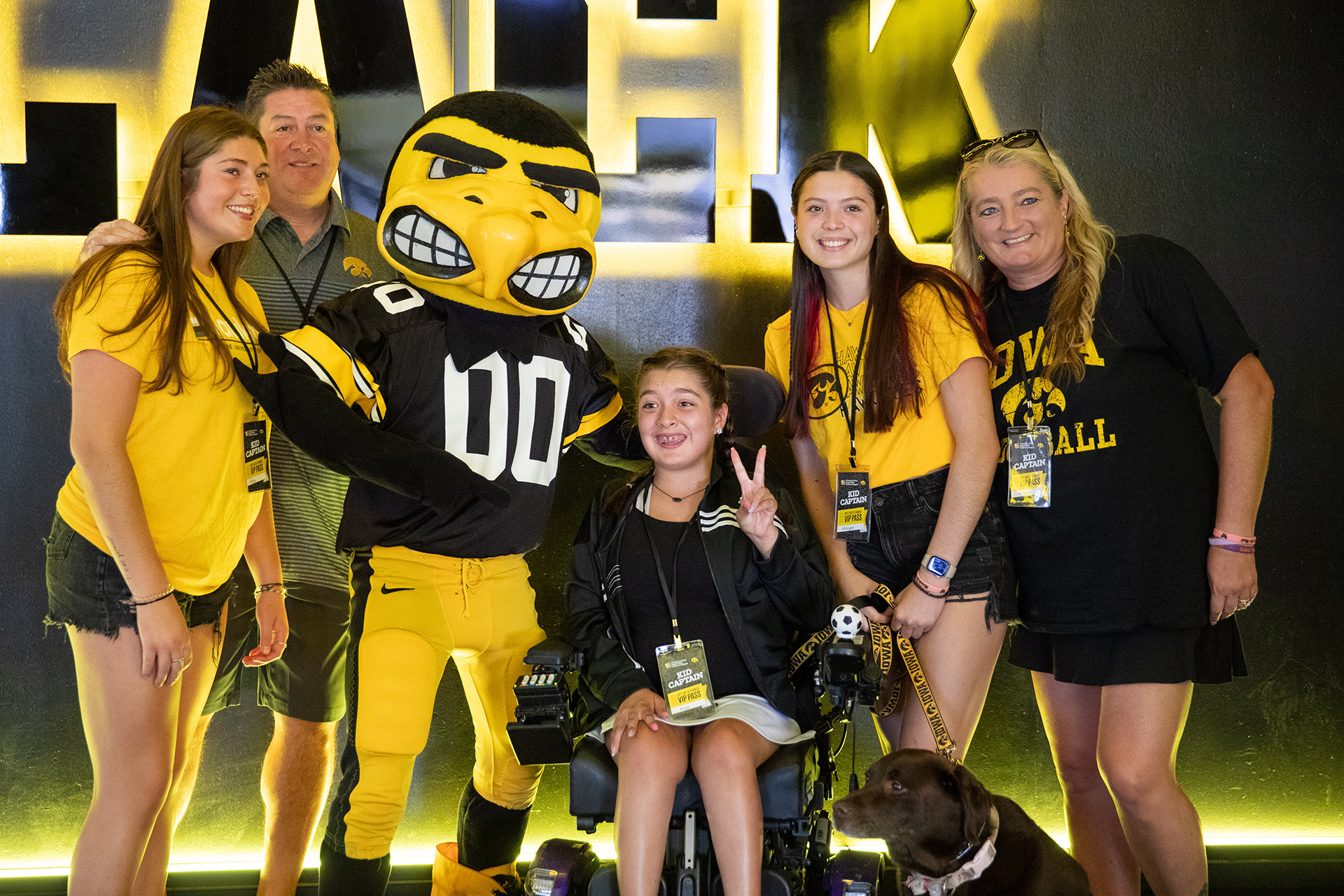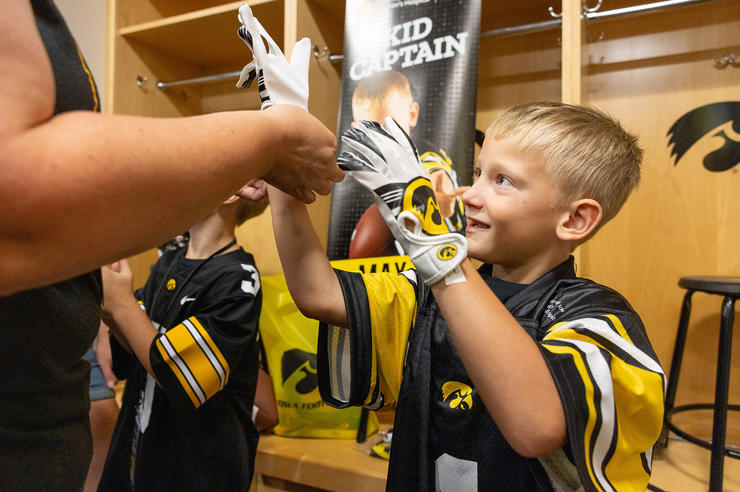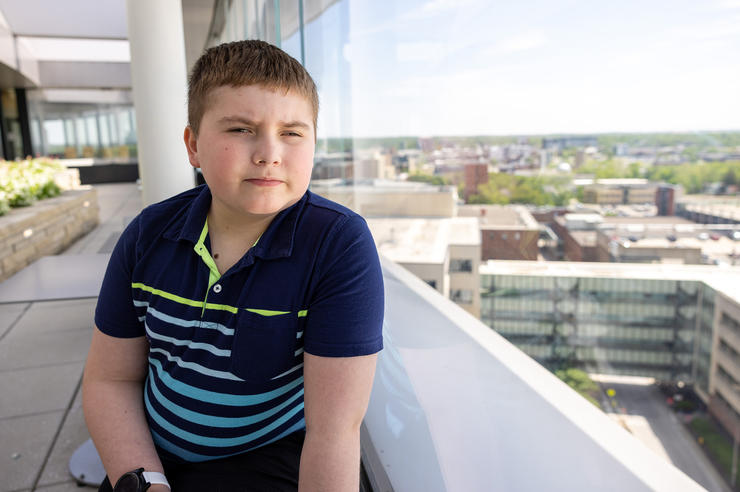Meet Kid Captain Madi Ramirez

Developmental milestones can be a cause for celebration when they are reached, or concern when they are not. Tom and Megan Ramirez were feeling the latter when their daughter, Madi, still wasn’t walking when she was 2.
“Madi was born about 10 weeks early at a local hospital and we knew she had some catching up to do,” says Megan. “By the time she was 2, she had a really funny crawl and she wasn’t walking yet, so we knew something else was wrong.”

University of Iowa Stead Family Children’s Hospital is Iowa’s only nationally ranked children’s hospital, offering all pediatric subspecialties and caring for kids from all 99 counties in Iowa. We provide world-class pediatric care that families trust—and kids deserve.
Madi was diagnosed at age 2 and a half with spinal muscular atrophy, a rare inherited disease that causes muscles to increasingly weaken. Just 10,000 to 25,000 children and adults are living with the rare disease in the United States. Told there was no cure, her parents found hope with neurologists at University of Iowa Stead Family Children’s Hospital.
“It’s kind of like ALS, but in children. It’s a very progressive disease and her muscles would just weaken over time. We were devastated,” Megan says. “At the time, they told us she would probably die as a teenager, that she would never walk, that she would lose the crawl that she had, and she would be in a wheelchair all of her life.”
Facing long odds against a progressive disease
Her husband, Tom, created “Madi bars,” a type of mini parallel bars, to help Madi learn to walk that summer. By the time she was 4, she could walk short distances, and went to kindergarten at age 5 without a wheelchair.
“We were hopeful,” Megan says. “We thought she would be the one who defies all the odds.”
In addition to neurologists, Madi saw pulmonologists to keep her lungs healthy, a nutritionist, and orthopedic specialists at UI Stead Family Children’s Hospital, where she also was diagnosed with autism, attention-deficit/hyperactivity disorder (ADHD), and neurogenic bladder, which causes frequent urination.
Her disease progressed slowly until fifth or sixth grade when muscle atrophy began setting in. At age 11, Madi began having seizures. She also fell out of her wheelchair, knocking out her four front teeth.
As her muscles weakened, she had grand mal seizures nearly daily for two years. These intense seizures can cause a loss of consciousness and violent muscle contractions.
“It was the worst time of her life,” Megan says, with Madi having to wear a concussion-prevention headband to school because of the seizures. “At that time, she was rapidly declining. She couldn’t feed herself anymore, she couldn’t crawl anymore, she couldn’t walk anymore. She became a different kid. She was angry; she was mean.”

“We are so lucky and so blessed to have the best research and children’s hospital in the nation. Madi’s teams of doctors have always put her first and care about her.”
Discovering a second diagnosis
After Madi’s health declined, her care team advised further testing. During an inpatient stay, she was finally diagnosed with 15q duplication, a rare condition unrelated to her earlier diagnosis.
This chromosome abnormality occurs when an extra copy of the genetic material located on the long arm of chromosome 15 is present in each cell. People with the disorder may experience developmental delay, intellectual disability, low muscle tone, seizures, and other health issues.
Madi’s doctors worked to find a drug combination that has kept her seizure-free for more than two years, and they ensured she had access to new drugs for spinal muscular atrophy that improved her muscle strength.
“She’s a totally different kid,” Megan said. “Back to her happy-go-lucky self.”
In 2018, Madi underwent spinal surgery for scoliosis, a 12-hour surgery. Following her surgery, the spinal injections she had been receiving for spinal muscular atrophy became more difficult, but Madi was approved to receive a new oral drug in 2020, and her parents have watched as her strength continues to grow.
The neuromuscular specialists at UI Stead Family Children’s Hospital work closely with other pediatric specialties, including cardiology, pulmonology, and endocrinology to provide a team-based approach for neuromuscular patients with complex medical needs.
The clinic provides expert care for all neuromuscular conditions, including (but not limited to):
- Muscular dystrophies
- Spinal muscular atrophy and related diseases
- Congenital myopathies
- Friedreich ataxia
- Myasthenia gravis, acquired or genetic
- Nerve diseases
Making progress, becoming advocates
“Madi’s smile returned, and we could focus on things like her teeth,” Megan says, noting that Madi’s four teeth that had been reinserted were dying and black. “This sweet, now teenager, would look in the mirror and scrub her teeth and would ask why they wouldn’t come clean.”
The orthodontic team decided her teeth needed to come out and they would use braces to close the gap and make her incisors her front teeth. She will have surgery in the future to move her jaw forward.
Madi has regained her ability to feed herself but experts do not expect her to be able to stand or to walk again due to how her muscles atrophied.
Now 17 and a high school senior, the LeClaire girl likes math and playing the card game Uno, performs in plays, is a Sparkles cheerleader, and works at a day care center as well as her school’s coffee shop.
Madi returns for regular appointments at the hospital and her parents advocated to have spinal muscular atrophy added to the Iowa Newborn Screening Program, so infants can now be diagnosed and treated early for the disease.
“We are so lucky and so blessed to have the best research and children’s hospital in the nation,” Megan says. “Madi’s teams of doctors have always put her first and care about her. The team approach has always been something that makes us feel so safe and secure bringing our daughter back time and time again.”



